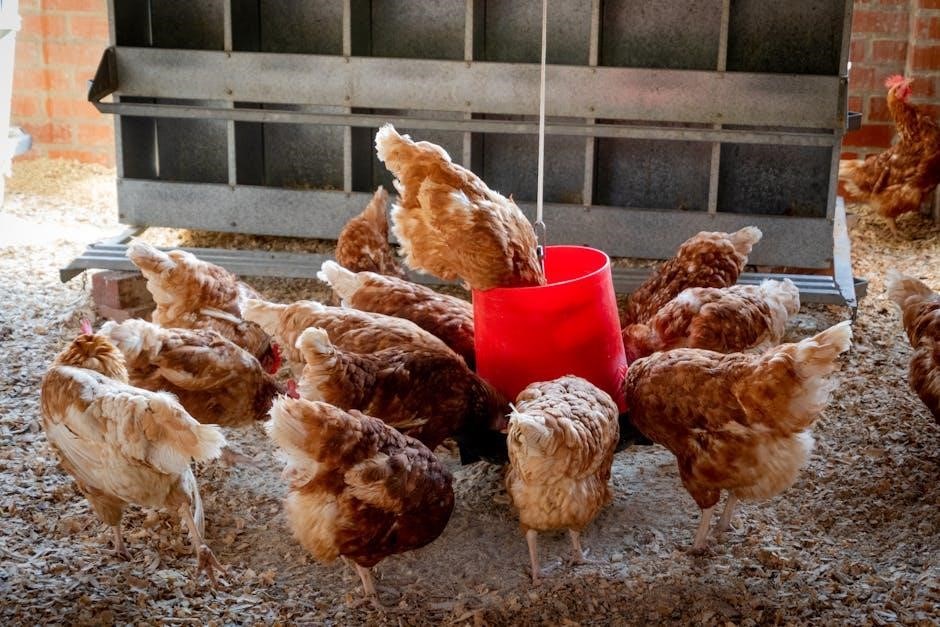Beta Puppy Food offers tailored nutrition for puppies, supporting healthy growth with antioxidants and DHA. Made without artificial colors or preservatives, it’s a quality choice for puppies.
1.1 Overview of Beta Puppy Food
Beta Puppy Food is a nutritionally balanced diet designed to meet the unique needs of growing puppies. It contains essential nutrients like antioxidants and DHA to support healthy development. The food is tailored to provide energy and promote strong growth, with no added artificial colors, flavors, or preservatives. It’s suitable for puppies from 1 to 18 months, depending on their expected adult size. The formula is also appropriate for gestation, lactation, and small adult dogs. Beta Puppy Food offers a complete and wholesome meal, ensuring your puppy gets the best start in life.
1.2 Importance of Proper Feeding for Puppies
Proper feeding is crucial for puppies, as it directly impacts their growth, energy levels, and overall health. A well-balanced diet ensures puppies receive essential nutrients like antioxidants and DHA, which support immune function and brain development. Improper feeding can lead to health issues, stunted growth, or weight problems. Using a high-quality food like Beta Puppy Food provides tailored nutrition, meeting puppies’ specific needs at different stages. Regular monitoring and adherence to feeding guidelines help maintain optimal health and vitality, setting the foundation for a thriving adult dog.

Understanding Puppy Nutrition Needs
Understanding puppy nutrition is key for their growth and health. Essential nutrients support energy, brain development, and immune function. Beta Puppy Food provides tailored nutrition with antioxidants and DHA.
2.1 Key Nutrients for Puppy Growth
Puppies require essential nutrients for optimal growth and development. Protein from sources like turkey or chicken supports muscle development, while fats provide energy. Carbohydrates, including whole grains, aid digestion and energy. DHA, an omega-3 fatty acid, is crucial for brain and vision development. Antioxidants help protect young immune systems, promoting overall health. Calcium and phosphorus are vital for strong bones and teeth. A balanced mix of vitamins and minerals ensures proper growth and prevents deficiencies. Beta Puppy Food is formulated to meet these nutritional needs, supporting healthy development in puppies.
2.2 Role of Antioxidants and DHA in Puppy Development
Antioxidants play a vital role in protecting puppies from oxidative stress, supporting their immune system and overall health. DHA, an omega-3 fatty acid, is essential for brain and vision development. It aids in cognitive function and supports nervous system growth. Beta Puppy Food includes these nutrients to ensure puppies develop properly. Antioxidants also help combat free radicals, promoting a healthy start in life. Together, they create a balanced foundation for growth, ensuring puppies thrive during their critical developmental stages.

Feeding Schedule for Puppies
A proper feeding schedule ensures puppies receive the right nutrition at each growth stage. Puppies under 3 months need frequent, moistened meals, while older puppies transition to fewer feedings.
3.1 Feeding Puppies Under 3 Months
Puppies under 3 months require frequent feeding to support rapid growth. Start with 3-4 daily feedings of moistened Beta Puppy Food to ease digestion. Gradually reduce moistening as they grow. Ensure access to fresh water alongside meals. Monitor weight and adjust portions to prevent overfeeding. Transition to solid food by 3 months, maintaining 3 feedings a day. Every puppy is different, so tailor portions based on size, breed, and activity level. Consult a vet for personalized feeding advice to ensure optimal health and development during this critical phase.
3.2 Feeding Puppies from 3 to 6 Months
Puppies aged 3 to 6 months require 3 daily feedings of Beta Puppy Food. Gradually reduce moistening to transition to solid food. Use the feeding guide on the packaging to determine portions based on expected adult weight. Ensure access to fresh water alongside meals. Monitor growth and adjust feedings to prevent overfeeding. Each puppy’s needs vary, so tailor portions accordingly. Regular weigh-ins and vet check-ups ensure optimal health. This period is crucial for establishing good eating habits and a balanced diet tailored to their development.
3.3 Feeding Puppies from 6 to 12 Months
From 6 to 12 months, puppies should be fed twice daily. As they mature, their energy needs stabilize, requiring careful monitoring to adjust portions and avoid overfeeding or underfeeding. Use the feeding guide on the packaging to determine amounts based on your puppy’s expected adult size. Ensure fresh water is always available. Each puppy’s needs vary, so tailor feedings to their size, breed, and activity level. A balanced diet during this phase supports sustained energy, healthy development, and prepares them for adult life.

Ingredients in Beta Puppy Food
Beta Puppy Food features high-quality protein sources like chicken, essential vitamins, and minerals. It includes antioxidants and DHA for cognitive and immune development, with no artificial additives.
4.1 Tailored Nutrition for Puppies
Beta Puppy Food is formulated to meet the unique nutritional needs of growing puppies, ensuring optimal development. With high-quality protein sources like chicken, it supports muscle growth and energy. The food is enriched with antioxidants to boost the immune system and DHA for brain development. Tailored to different life stages, Beta Puppy Food adapts to a puppy’s growth, providing balanced nutrition without artificial colors or flavors. This ensures a strong foundation for a healthy, active life, making it a trusted choice for pet owners seeking comprehensive puppy care.
4.2 Essential Ingredients for Growth and Health
Beta Puppy Food contains high-quality protein sources like chicken, essential for muscle development and energy. Whole grains provide sustained energy and fiber, while vegetables add vitamins and minerals. Antioxidants support immune health, and DHA promotes brain and eye development. The formula avoids artificial colors, flavors, and preservatives, ensuring a natural and balanced diet. These ingredients work together to support overall growth, digestion, and long-term health, making Beta Puppy Food a nutritious choice for raising a vibrant and healthy puppy.

Transitioning to Beta Puppy Food
Introduce Beta Puppy Food gradually to prevent digestive upset. Start by mixing a small amount with their current food, increasing the proportion over 7-10 days.
When transitioning your puppy to Beta Puppy Food, a gradual approach is essential to avoid digestive upset. Start by mixing a small amount of Beta with their current food, increasing the proportion daily. Over 7-10 days, gradually phase out the old food until your puppy is fully transitioned. This method helps their sensitive stomach adjust to the new ingredients. Monitor for signs of digestive discomfort, such as diarrhea or lethargy, and consult your vet if issues persist. A smooth transition ensures your puppy continues to thrive without unnecessary stress.
5.2 Tips for a Smooth Transition
For a seamless switch to Beta Puppy Food, start by mixing a small portion with their current diet, gradually increasing the ratio over 7-10 days. Monitor your puppy’s behavior and stool quality, adjusting the transition pace if needed. Divide daily portions into smaller, frequent meals to ease digestion. Avoid overfeeding, as this can lead to discomfort. Ensure fresh water is always available. Tailored nutrition in Beta supports healthy growth, but consistency is key. If your puppy shows signs of distress, consult your veterinarian for personalized advice. A patient approach ensures a hassle-free transition.

Monitoring Puppy Growth and Health
Regularly monitor your puppy’s weight, energy levels, and physical development. Ensure a balanced diet with Beta Puppy Food to support healthy growth and overall well-being.
6.1 Signs of Healthy Growth in Puppies
A healthy puppy exhibits steady weight gain, shiny coat, and high energy. Proper feeding with Beta Puppy Food ensures strong bones and a robust immune system. Consult your vet regularly to track progress and address any concerns promptly, ensuring your puppy thrives during critical growth stages.

6.2 Adjusting Feeding Portions as Puppies Grow
As puppies grow, their food portions need adjustment to match their developmental stage. Puppies under three months typically require three to four meals daily, reducing to three meals between three to six months, and finally two meals from six to twelve months. Adjustments should consider the puppy’s breed, size, and activity level. Monitoring weight and health is crucial; consult a vet for personalized advice. Transitioning slowly to new portion sizes prevents digestive issues. Using high-quality food like Beta Puppy Food, rich in antioxidants and DHA, supports optimal growth and development.

Common Mistakes to Avoid
Overfeeding or underfeeding can harm a puppy’s health. Ignoring feeding guidelines and not adjusting portions as puppies grow are common errors to avoid for optimal development.
7.1 Overfeeding or Underfeeding Puppies
Overfeeding or underfeeding can significantly impact a puppy’s health. Providing too much food may lead to obesity and related issues, while too little can cause stunted growth. It’s essential to follow the feeding guide on the packaging to ensure the right portion sizes. Regular monitoring of weight and growth is crucial. Adjustments should be made gradually to prevent digestive upset. Consulting a vet is recommended for personalized advice, especially for breeds with specific needs. Proper feeding balance is key to raising a healthy, thriving puppy.
7.2 Ignoring Feeding Guidelines on the Packaging

Ignoring the feeding guidelines on the packaging can lead to serious health issues for puppies. Feeding charts are designed based on a puppy’s expected adult weight and life stage, ensuring proper nutrition. Overlooking these recommendations may result in overfeeding or underfeeding, causing obesity, stunted growth, or nutrient deficiencies. Each puppy’s needs are unique, and guidelines help tailor portions accordingly. Consistently disregarding these instructions can lead to long-term health problems. Always consult a vet if unsure, as proper feeding practices are vital for a puppy’s optimal development and well-being.
Proper feeding practices with Beta Puppy Food ensure optimal growth and health. Tailored nutrition, antioxidants, and DHA support development, making it a reliable choice for raising a healthy puppy.
8.1 Summary of Key Feeding Guidelines
Feeding Beta Puppy Food requires following specific guidelines to ensure optimal growth. Puppies under 3 months should be fed 3-4 times daily, gradually reducing to 3 meals until 6 months, and 2 meals from 6-12 months. Tailored nutrition, including antioxidants and DHA, supports healthy development and digestion. Always refer to the packaging for portion sizes based on your puppy’s weight and breed. Consistency and monitoring are key to avoiding overfeeding or underfeeding, ensuring your puppy thrives during its critical growth phases.
8.2 Final Tips for Raising a Healthy Puppy
Raising a healthy puppy requires consistent effort and attention to detail. Ensure your puppy receives a balanced diet tailored to their growth stage, with essential nutrients like antioxidants and DHA. Always follow the feeding guide on the packaging and monitor their weight to avoid overfeeding. Provide fresh water at all times and encourage regular exercise to support physical development. Socialization and positive reinforcement training are crucial for emotional well-being. Schedule regular vet check-ups to track growth and address any health concerns early. With patience and proper care, your puppy will thrive into a strong, vibrant adult.

No Responses